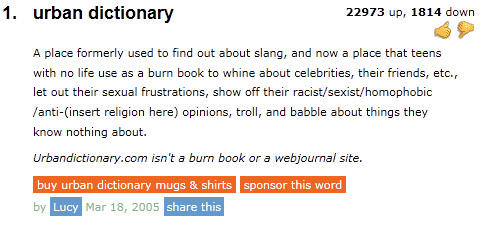
About Urban Dictionary
Urban Dictionary[1] is a dictionary site composed of user-submitted definitions for slang terms used either online or in real life that are not defined in an actual dictionary. Once submitted, each definition entry is ranked by the user base and showcased in the order of popularity.
History
The Urban Dictionary website was created in 1999 by Aaron Peckham when he was a freshman studying computer science at California Polytechnic State University.[2] He started the site as a parody of dictionary.com, defining words that he heard around campus and sharing them with his friends.[3] Peckham initially advertised the site with posters around his college campus, but never did any major advertising and most of its spread has been through word of mouth.[7] The domain name Urbandictionary.com was registered in October 2001 and the submission rate of definition entries nearly quadrupled since its launch.
Among the first definition entries submitted to the site was "the man," submitted on August 13th, 2003:
The man is the head of ‘the establishment’ put in place to ‘bring us down.’
Between June and July 2008, Urban Dictionary released a number of new site features and offline products, including an official blog for the latest updates, a redesigned editor page, a mobile-friendly version of the site, a "browse" page which indexes most popular words by alphabetical order. The website began receiving attention from the blogosphere and news media in 2008, with its inclusion in LifeHacker's feature article[21] "Best Online Language Tools for Word Nerds" and Time Magazine's 50 Best Websites of 2008[22]:
Forget about learning Spanish or Chinese. The language you really need to know to keep up -- in the U.S. anyway -- is street lingo. To stay hip, visit Urban Dictionary, which has millions of user-submitted words and definitions.
They can also be found on Flickr[24], Tumblr[4], Twitter[5], and Facebook[6], where they have over 1.7 million likes.
Traffic
By July 2009, four million definition entries had been submitted, according to the New York Times.[23] In a Fall 2011 interview with his college’s magazine, Peckham claimed that approximately 2000 definitions are submitted to the site daily, averaging out to 1.3 a minute.[7] As of January 2012, there are over 6.3 million definitions in the dictionary. The website has a Quantcast[8] rank of 92, a Compete[9] rank of 367, and an Alexa[10] US rank of 356. The highest recorded traffic for the site was on February 3rd, 2010, the same day Mashable[11] posted an article about a Facebook trend where people were posting the Urban Dictionary definitions of their names as their statuses.
Features
Anyone can submit a definition to the site and making an account is not necessary. All new definitions must be approved by the site's volunteer editors before they are published. The editors are given ten guidelines[18] to follow when deciding on new additions:
1. Publish celebrity names but reject friends' names.
2. Publish racial and sexual slurs but reject racist and sexist entries.
3. Publish opinions.
4. Publish place names.
5. Publish non-slang words. Ignore misspellings and swearing.
6. Publish jokes.
7. Reject sexual violence.
8. Reject nonsense. Be consistent on duplicates.
9. Reject ads for web sites.
10. Publish if it looks plausible.
One a word is published, users can then give each definition a thumbs up or thumbs down to help narrow down the best results for a word. Users can also decide on which videos[20] get added to entries. Lastly, Urban Dictionary has a discussion forum[19] where users can vote on new features the site should implement.
Other Urban Dictionary Publications
The first Urban Dictionary book[12] was published on October 1st, 2005 with over 300 pages compiled from the 170,000 definitions on the site at the time. Since then, several calendars and a second book have been published[13], with a third scheduled to be released on March 27th, 2012.


An academic study[14] of the site was published in February 2007 by researchers from Queen Mary, University of London and Arizona State University. The research investigated not only the way some definitions receive more value and legitimacy than others, but also the processes by which the slang words are formed.
UrbanDictionary.tv
On January 19th, 2012, UrbanDictionary.tv[16] launched. Powered by video aggregator site VHX[17], the site shows a definition from the site and pairs it with a video that illustrates the word. Users can vote on the video's accuracy and suggest alternate videos.
Search Interest
External References
[2] Wikipedia – Urban Dictionary
[3] NPR – Slang Dictionary on the Web
[4] Tumblr – Urban Dictionary
[5] Twitter – @urbandaily
[6] Facebook – Urban Dictionary
[7] Cal Poly Magazine – Move Over Merriam Webster: Alum Aaron Peckham’s Urban Dictionary Redefines Language
[8] Quantcast – Urban Dictionary
[9] Compete – Urban Dictionary
[10] Alexa – Urban Dictionary
[11] Mashable – Facebook Trends: Goodbye Doppelganger, Hello Urban Dictionary Week
[12] Amazon – Urban Dictionary: Fularious Street Slang Defined
[13] Amazon – Results for "urban dictionary"
[14] Queen Mary's Occasional Papers Advancing Linguistics #9 – Online Dictionaries as Emergent Archives of Contemporary Usage and Collaborative Codification
[15] On The Media – Word: Transcript | Interview with Aaron Peckham
[16] UrbanDictionary.tv – Home
[18] Urban Dictionary – Editor Guidelines
[20] Urban Dictionary – Publish/Don't Publish
[21] LifeHacker – Best Online Language Tools for Word Nerds
[22] TIME – 50 Best Websites of 2008
[23] NYTimes – Street Smart: Urban Dictionary
[24] Flickr – Urban Dictionary
Recent Videos 4 total
Recent Images 34 total
Share Pin

















Top Comments
Lycanroc
May 25, 2015 at 02:11PM EDT
The Big Bad Memebag
May 25, 2015 at 04:25PM EDT